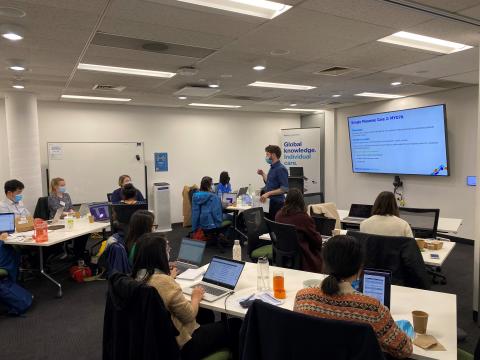
Melbourne Genomics’ brand-new extended course, Introduction to Clinical Variant Interpretation for Medical Scientists, successfully wrapped up in September.
Variant interpretation is the process of finding and prioritising the variants (or gene changes) found in a genomic test, then collecting and curating evidence to determine how likely they are to explain the cause of a condition or cancer and identifying treatments the patient may respond to.
The program provides a solid foundation in variant interpretation principles and processes, that participants can then apply in the lab, for both diagnostic and research purposes.
Over the course of two months, 32 medical scientists, researchers, clinicians, bioinformaticians and students completed online modules and attended three workshops.
Attendees learned direct from experts across the Alliance, with instructors Lyndon Gallacher of the Victorian Clinical Genetics Services, Dr Bryony Thompson of The Royal Melbourne Hospital and Dr Victoria Beshay of the Peter MacCallum Cancer Centre.
“Variant interpretation is such a complex skill to both teach and learn,” said Dr Bryony Thompson, a senior genomic scientist.
“Being able to hold the workshops face-to-face and to be able to walk through case studies has been critical in connecting sometimes abstract genomic concepts to real-world applications that attendees will encounter in their professional roles.”
A majority (87%) of attendees indicated they would incorporate learnings into their professional practice, with participants reporting increases in their understanding and confidence in the laboratory and bioinformatics processes involved in genomic testing. Ratings of ‘very good’ understanding and higher more than doubled after the program.
The course marks the first time Melbourne Genomics has offered face-to-face genomic education since 2019. Melbourne Genomics continue to offer genomics education events, with the follow up Advanced Clinical Variant Interpretation course kicking off this month.
